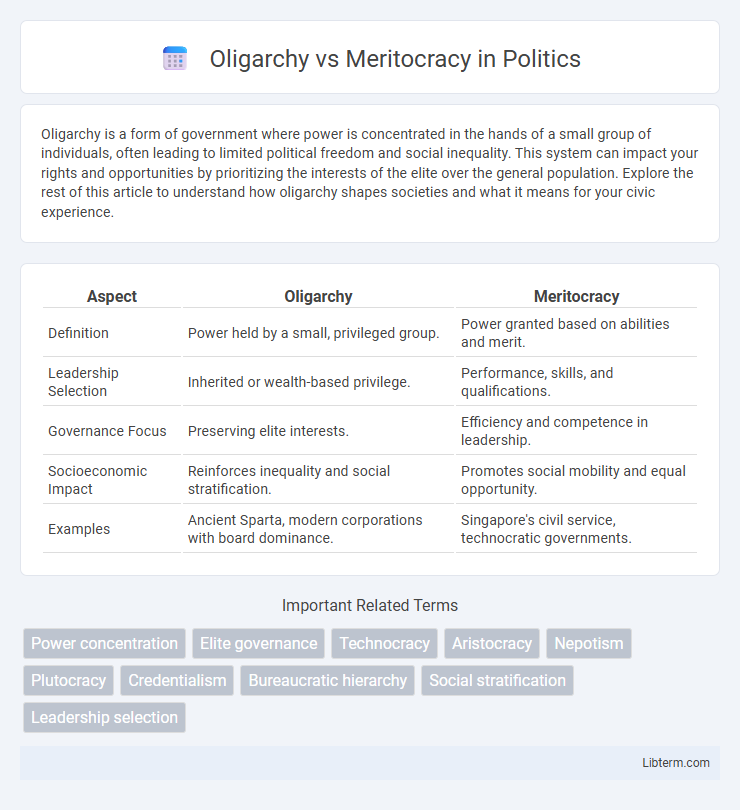Oligarchy is a form of government where power is concentrated in the hands of a small group of individuals, often leading to limited political freedom and social inequality. This system can impact your rights and opportunities by prioritizing the interests of the elite over the general population. Explore the rest of this article to understand how oligarchy shapes societies and what it means for your civic experience.
Table of Comparison
| Aspect | Oligarchy | Meritocracy |
|---|---|---|
| Definition | Power held by a small, privileged group. | Power granted based on abilities and merit. |
| Leadership Selection | Inherited or wealth-based privilege. | Performance, skills, and qualifications. |
| Governance Focus | Preserving elite interests. | Efficiency and competence in leadership. |
| Socioeconomic Impact | Reinforces inequality and social stratification. | Promotes social mobility and equal opportunity. |
| Examples | Ancient Sparta, modern corporations with board dominance. | Singapore's civil service, technocratic governments. |
Understanding Oligarchy: Definition and Origins
Oligarchy is a form of governance where power is concentrated in the hands of a small, elite group, often based on wealth, family ties, or military control. Its origins trace back to ancient city-states like Sparta and Venice, where ruling minorities exerted influence through social hierarchies and controlled political decisions. Understanding oligarchy reveals how limited participation contrasts sharply with meritocratic systems that emphasize individual achievement and talent as the criteria for leadership.
Meritocracy Explained: Core Principles and Values
Meritocracy operates on the principle that individuals advance based on talent, effort, and achievement rather than wealth or social status. Core values include fairness, equal opportunity, and rewarding competence, aiming to create a society where leadership and success derive from merit. This system fosters innovation and efficiency by promoting skilled and capable individuals in decision-making roles.
Historical Examples of Oligarchies
Historical examples of oligarchies include Ancient Sparta, where power was concentrated in a small group of elite warriors and elders controlling political and military decisions. The Venetian Republic during the Renaissance exemplified an oligarchic government led by a limited number of wealthy merchant families dominating trade and governance. In South Africa, apartheid-era rule was an oligarchy, with a minority white population exercising control over the majority black population through institutionalized segregation and economic dominance.
How Meritocracies Have Shaped Modern Societies
Meritocracies have transformed modern societies by promoting leadership and social mobility based on individual talent, education, and achievements rather than inherited wealth or class. This system fosters innovation, economic growth, and efficient governance by rewarding competence and hard work. Countries emphasizing meritocratic principles, such as Singapore and South Korea, demonstrate significant advancements in technology, education, and overall quality of life.
Key Differences: Oligarchy vs Meritocracy
Oligarchy concentrates power in the hands of a few individuals or families, often based on wealth, social status, or political influence, whereas meritocracy allocates leadership roles based on individual talent, skills, and achievements. In an oligarchy, governance decisions reflect the interests of a limited elite, while meritocracy emphasizes fairness by promoting those with proven competence regardless of background. The key distinction lies in the source of authority: inherited or concentrated power in oligarchy versus earned merit and performance in meritocracy.
Social Mobility in Oligarchic and Meritocratic Systems
Social mobility in oligarchic systems is typically constrained, as power and wealth are concentrated within a small, elite group that limits access to opportunities for the broader population. In meritocratic systems, social mobility is driven by individual talent, effort, and achievements, enabling individuals to rise based on merit rather than inherited status. Empirical studies show that meritocracies exhibit higher rates of upward mobility compared to oligarchies, where structural barriers reinforce socioeconomic stagnation.
Power Distribution: Elite Rule vs Earned Positions
Oligarchy centralizes power among a select group of elites who maintain control through wealth, family ties, or political influence, limiting broader participation in governance. Meritocracy distributes power based on individual skills, achievements, and qualifications, promoting leadership positions earned through demonstrated competence. This key difference shapes political systems by either reinforcing inherited privilege or encouraging equal opportunity for leadership through merit.
Economic Outcomes: Oligarchy and Meritocracy Compared
Oligarchies concentrate wealth and decision-making power in the hands of a few, often leading to economic inequality and reduced social mobility, which can stifle innovation and long-term growth. Meritocracies promote economic outcomes driven by talent and effort, fostering competitive markets, higher productivity, and broader access to opportunities. Empirical studies reveal that meritocratic systems generally achieve more sustainable economic development and greater income distribution fairness compared to oligarchic structures.
Criticisms and Challenges Faced by Each System
Oligarchy faces criticism for concentrating power in the hands of a few elites, leading to unequal representation and fostering corruption and nepotism. Meritocracy is challenged by inherent biases in defining and measuring merit, often perpetuating social inequalities despite its aim to reward talent and effort. Both systems struggle with balancing fairness and efficiency while addressing the risk of entrenched power structures limiting social mobility.
The Future of Governance: Blending Oligarchy and Meritocracy
The future of governance may involve blending oligarchy and meritocracy to harness the strengths of both systems, promoting efficient decision-making while ensuring leadership is based on talent and expertise. Hybrid models increasingly prioritize meritocratic principles within an elite framework, where a select group of individuals gains power through demonstrated competence and societal contributions. Advances in technology and data-driven governance support this blend by enabling transparent evaluation of leaders' merits alongside the strategic control maintained by oligarchic structures.
Oligarchy Infographic

 libterm.com
libterm.com